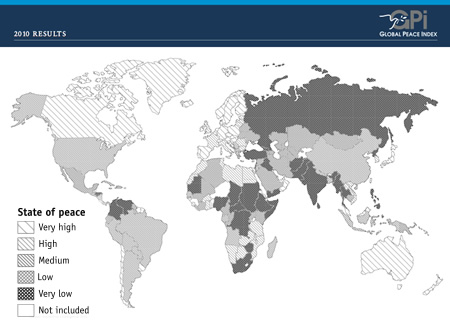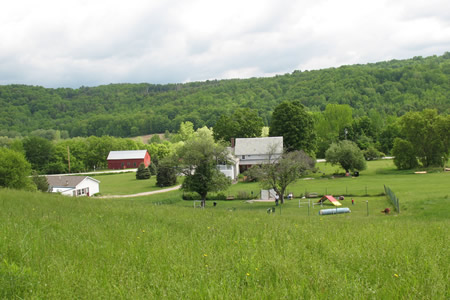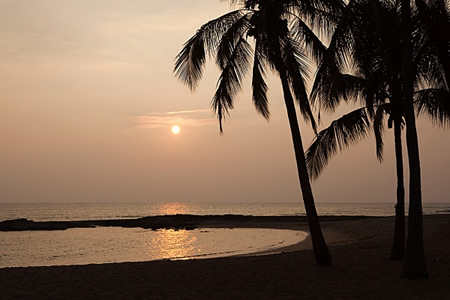« Longines Prize for Elegance 2010 | Main | RED BULL AIR RACE WORLD CHAMPIONSHIP 2010 »
June 17, 2010
Global Peace Index 2010
• World Less Peaceful in 2010.
• Violence Impacting Global Economy $7 Trillion Annually.
• New Zealand tops rankings for second consecutive year.
• 4-year trends show Middle East and Africa with most gains in peacefulness.
• South Asia sees sharpest fall in peace.
• Military spending as a % of GDP reaches its lowest point in 4 years.



The world became less peaceful for the second consecutive year, according to the just published fourth annual Global Peace Index (GPI). As the global economy continues to falter, this year's data shows an intensification of conflicts and growing instability linked to the downturn that began in 2008, with several countries seeing sharp increases in homicides, violent demonstrations and fear of crime.
The increase in violence is depriving the global economy of assets when they are needed most. A 25 percent reduction in global violence would free up $1.8 trillion USD annually -- enough to pay off Greece's debt, fund the achievement of the Millennium Development Goals (MDGs) and meet the EU's 20-20-20 climate and energy targets.

The only study to quantify global peacefulness, the GPI is produced by the Institute for Economics and Peace (IEP). This year it has expanded to rank 149 independent states. Composed of 23 qualitative and quantitative indicators, it combines internal and external factors ranging from military expenditure to relations with neighboring countries and levels of violent crime.
• Global Peace Index (GPI) 2010: Rankings for 149 Countries
"The research carried out by the IEP based on 4 years of GPI data provides a quantifiable demonstration that improving peace can transform the global economy and unleash the wealth needed to tackle debt, fund economic expansion and create a more sustainable environment," said Steve Killelea, founder of the GPI.

Top-ranked New Zealand was one of only three countries in the top ten to improve in peacefulness in the 2010 Index. Iceland moved into the #2 spot as the country's economy stabilised after falling to #4 in last year's ranking, the improvement demonstrating the resilience of peaceful nations.
Despite the global slide, the Middle East & North Africa and Sub-Saharan Africa have made the most gains since the research began in 2007. Reasons for the improvement vary, but include more political stability and a drop in military expenditure in the Middle East & North Africa and less access to weapons, a decrease in conflicts and better relations with neighboring countries in Sub-Saharan Africa.

Conversely, South Asia saw the greatest decrease in peacefulness, as a result of increased involvement in internal conflicts. The main countries experiencing decreases in peacefulness were India, Sri Lanka and Pakistan.
The US improved its 2010 score but slipped three spots down the index due to the addition of new countries and the re-rating of the number of heavy weapons.
Western Europe continues to be the most peaceful region, with the majority of the countries ranking in the top 20. All five Scandinavian nations rank in the top ten; however, Denmark dropped five spots to #7.
Iraq, Somalia and Afghanistan were the least peaceful countries for the second consecutive year. Syria, Georgia, the Philippines, Russia and Cyprus were this year's biggest fallers.

• The GPI was founded by Killelea, an Australian international technology entrepreneur and philanthropist. It forms part of the Institute for Economics and Peace, a global think tank dedicated to the research and education of the relationship between economics, business and peace. An international panel of experts in the study of peace advises on the identification and weighting of indicators in the GPI, which is compiled by the Economist Intelligence Unit.
Source: Institute for Economics and Peace
|GlobalGiants.Com|
"These six things doth the LORD hate: yea, seven are an abomination unto him:
A proud look, a lying tongue, and hands that shed innocent blood,
A heart that deviseth wicked imaginations, feet that be swift in running to mischief,
A false witness that speaketh lies, and he that soweth discord among brethren."
-- Proverbs of Solomon 6:16-19.
"There be three things which go well, yea, four are comely in going:
A lion which is strongest among beasts, and turneth not away for any;
A greyhound; A he-goat also;
And a king, against whom there is no rising up."
-- Proverbs of Solomon 30:29-31.
[A lion marches on and does not alter his pace or quit his path when other animals come in his way. A greyhound (fastest hunting dog) remains ready for his course and performs it with swiftness. A he-goat walks in front of the flock, as one careful about it, and attentive to its safety. And a king goes gracefully when he reigns in the hearts of his people, and commands a unanimous, victorious army (visible or invisible), whom none dare oppose.]







Edited & Posted by the Editor | 2:23 AM | Link to this Post









